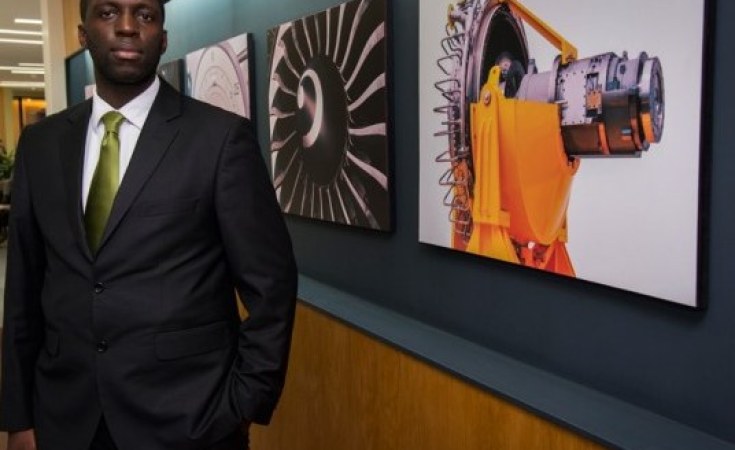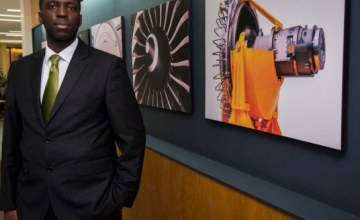Lagos — Dedicated to innovation in infrastructure, healthcare, energy and transportation, GE Africa is committed to leadership, integrity, partnership and human progress. GE businesses, ranging from Oil & Gas, Power & Water, Energy Management, Transportation, Aviation, Capital and Healthcare, all have operations in Africa. Major locations include Angola, Ghana, Kenya, Nigeria and South Africa.
GE Kujenga is our sustainability program in Africa. The word kujenga means "build" in Swahili, and GE is a partner in building Africa's sustainable future. Our approach is to empower people by building valuable skills, equip communities with new tools and technology, and elevate ideas that are helping to solve Africa's challenges.
At GE, we are committed to Africa's sustainable development operating under GE's hallmarks of responsible leadership and operational excellence. Embodying kujenga means that while we run our businesses, we also ensure that we are making a difference—creating value for societies in ways that also support the Company's business strategy. As our presence in Africa grows, so does our effort to be responsible citizens in the community.
Empower
GE is committed to empowering the communities in which it operates by providing skills training and developing leaders. As a major employer in Africa, it is vital that we collaborate with local institutions to develop strong workforces and create opportunities for further growth. At GE, we know that empowering local communities not only benefits local stakeholders, but also contributes to our overall objective of building stronger markets. By investing in people, we are ultimately investing in this continent.
How We Empower
We work to empower communities through various initiatives, some examples of which are:
Leadership Programs: GE is proud to be known for its leadership programs around the world, which target new and emerging talent and develop future leaders. Some of the programs currently running in Africa are the Financial Management Program (FMP), the Operations Management Leadership Program (OMLP), the Human Resources Leadership Program (HRLP), the Experienced Commercial Leadership Program (ECLP), the Commercial Leadership Program (CLP), the Communications Leadership Development Program (CLDP), the Edison Engineering Development Program (EEDP), the Information Technology Leadership Program (ITLP) and the Early Career Development Program (ECDP). The ECDP identifies high-potential entry-level candidates across Africa and provides essential skills training and leadership training to prepare participants for successful careers in their chosen disciplines. The program combines hands-on experience with formal training to empower participants to become leaders at GE. We are proud of the fact that, since the program's inception in 2011 to the end of 2013, more than 80 graduates of the program have taken on various full-time roles, making a difference in Africa.
Partnership with the African Leadership Academy (ALA): GE is building a pipeline by supporting the development of a future generation of African leaders through partnerships with institutions like the African Leadership Academy. These partnerships are designed to enrich employability and provide a means for talented young people to access networks and opportunities that would otherwise be unavailable to them. GE works with the ALA to create employment opportunities through its Finalist Camp & Scholars program. GE has committed up to $5 million to this partnership, which will identify, develop and connect the next generation of African leaders. The program provides training as well as internship and postgraduate employment opportunities.
GE Africa Learning Advisory Board: GE Africa has launched the first GE Africa Learning Advisory Board, with a focus on local technical skills development. The Board brings together 20 members drawn from GE, Africa, Europe and North America with a primary focus on local technical and engineering skills development across Africa.
Investment in Calabar Tech: GE has partnered with Calabar Tech in Nigeria by investing in an upgrade of its facilities, equipment, instructor training and curriculum. This school is training students in areas of strategic importance to Nigeria's economic development such as process engineering, as well as in higher vocational skills, such as machining, welding and assembly.
Supplier Development: GE Africa operates a supplier development program for local companies that have been identified as having capabilities that are aligned to our engineering services needs. The program focuses on developing and expanding their technical and managerial capabilities through skills development and technology transfer. Currently, there are four Nigerian companies participating in this program. This initiative is in line with our commitment to empowering small and medium-scale enterprises in Africa.
Equip
GE has pledged to equip its host countries with the material and systems needed to widen access to healthcare and other essential services. GE uses its expertise and technological track record to bring tools, technology and training to communities, strengthen rural healthcare provision and respond in times of natural disasters.
How We Equip
We work to equip communities through various initiatives, some examples of which are:
Developing Health Globally: GE places a particular emphasis on improving healthcare for mothers and children, as part of the global efforts to achieve Millennium Development Goals 4 and 5 targeted at maternal and newborn health. GE's Developing Health Globally™ program, run through the GE Foundation, operates in nine countries in Africa, and, in addition to supporting maternal and child health, also improves surgical care and provides equipment to these communities. We estimate that up until 2013, Developing Health Globally has touched 12.8 million lives across Africa, and we continue to look for ways to further extend this program in the healthcare sector. Additionally, GE, in partnership with the GE Foundation, has committed $61 million to date to a range of healthcare projects, including ImPACT Africa, a program that assists in the delivery of safe surgery in rural Western Kenya, run in partnership with the Kenyan Ministry of Health, among other partners. This project focuses primarily on developing training programs that can lower surgical mortality rates, as well as improve anaesthetic care.
healthymagination: healthymagination is a GE business model that addresses one of the toughest challenges in the world: access to healthcare. This effort is focused on designing technologies, partnerships and solutions that enable better healthcare in rural settings. The Ifakara Health Institute, in Tanzania, is one of our core external partners in addressing Millennium Development Goals 4 and 5. GE provides Ifakara with portable ultrasound devices that will be used by midwives and nurses to assess the well-being of pregnant women in rural areas of Tanzania. All the midwives and nurses were fully trained on use of the equipment by a team of GE trainers. The project will increase healthcare reach in rural areas and offers a cost-effective and simple method to track maternal health indicators.
Mozambique Flooding: The GE Foundation made a $50,000 donation to the International Federation of the Red Cross to support the victims of the January 2013 flooding in Mozambique. The GE Foundation, along with employees' personal donations, played a role in responding with financial support.
Elevate
At GE, innovation is at the heart of everything we do. We are determined to elevate the communities in which we operate by lending scale and resources to transformative ideas that have the potential to solve local challenges. We support entrepreneurs in developing new technologies and approaches to tackle local problems, and fund research into new solutions, with a particular focus on energy.
How We Elevate
We work to elevate communities through various initiatives, some examples of which are:
Partnership with Burn Manufacturing: GE is committed to using its technical capabilities to support research into developing and implementing cost-effective, sustainable solutions to everyday problems. GE has been supporting the BURN Manufacturing Co. (BMC) in its Cookstoves Project in Kenya, in partnership with Overseas Private Investment Corporation (OPIC), the U.S. Government's development finance institution. BMC produces inexpensive, durable and high-efficiency cookstoves. These cookstoves will save lives and contribute to environmental protection by using clean energy rather than traditional fuels such as wood. GE has committed $1 million to the development of the project, which has supported the construction of a manufacturing facility in Kenya, as well as satellite facilities in Rwanda, Tanzania and Uganda.
Distributed Power University Challenge: In Kenya, GE sponsors the Distributed Power University Challenge Award to identify and reward projects that provide power for local communities. Projects that have been rewarded include one that uses mobile phones to control wind turbines providing power to rural households in Kenya. The Distributed Power University Challenge offers young designers and innovators the opportunity to connect with industry partners that can help turn their projects into reality, as well as meaningful improvements to local communities.
GE & USADF Off-Grid Energy Challenge: GE Africa launched a partnership with the United States African Development Foundation (USADF) to run the Power Africa Off-Grid Energy Challenge. The objective of this initiative is to promote innovative solutions that develop, scale up or extend proven technologies for off-grid energy—reaching communities not yet served by existing power grids. This project was launched in Nigeria and Kenya, with six African-owned organizations receiving grants of $100,000 each. All are organizations that provide off-grid solutions that deploy renewable resources and power economic activities. The Challenge forms part of the larger Power Africa initiative, which has been launched by the U.S. Government to drive growth across the African continent by increasing access to reliable, affordable and sustainable power. While the Challenge was launched in Nigeria and Kenya, it will likely expand to include Ghana, Uganda, Tanzania and Ethiopia in 2014.



